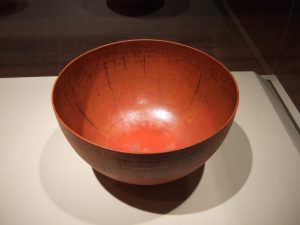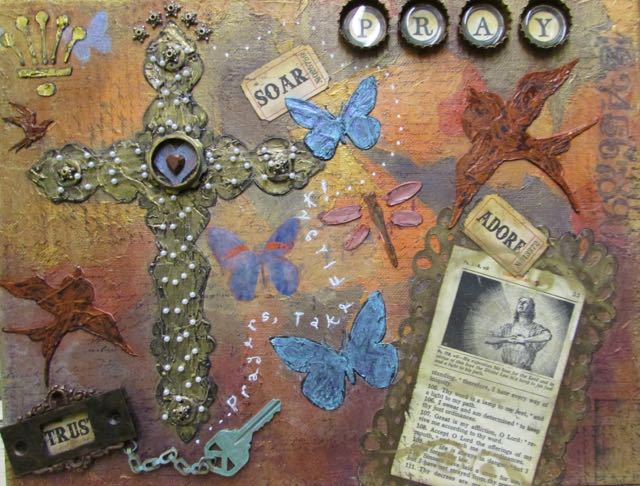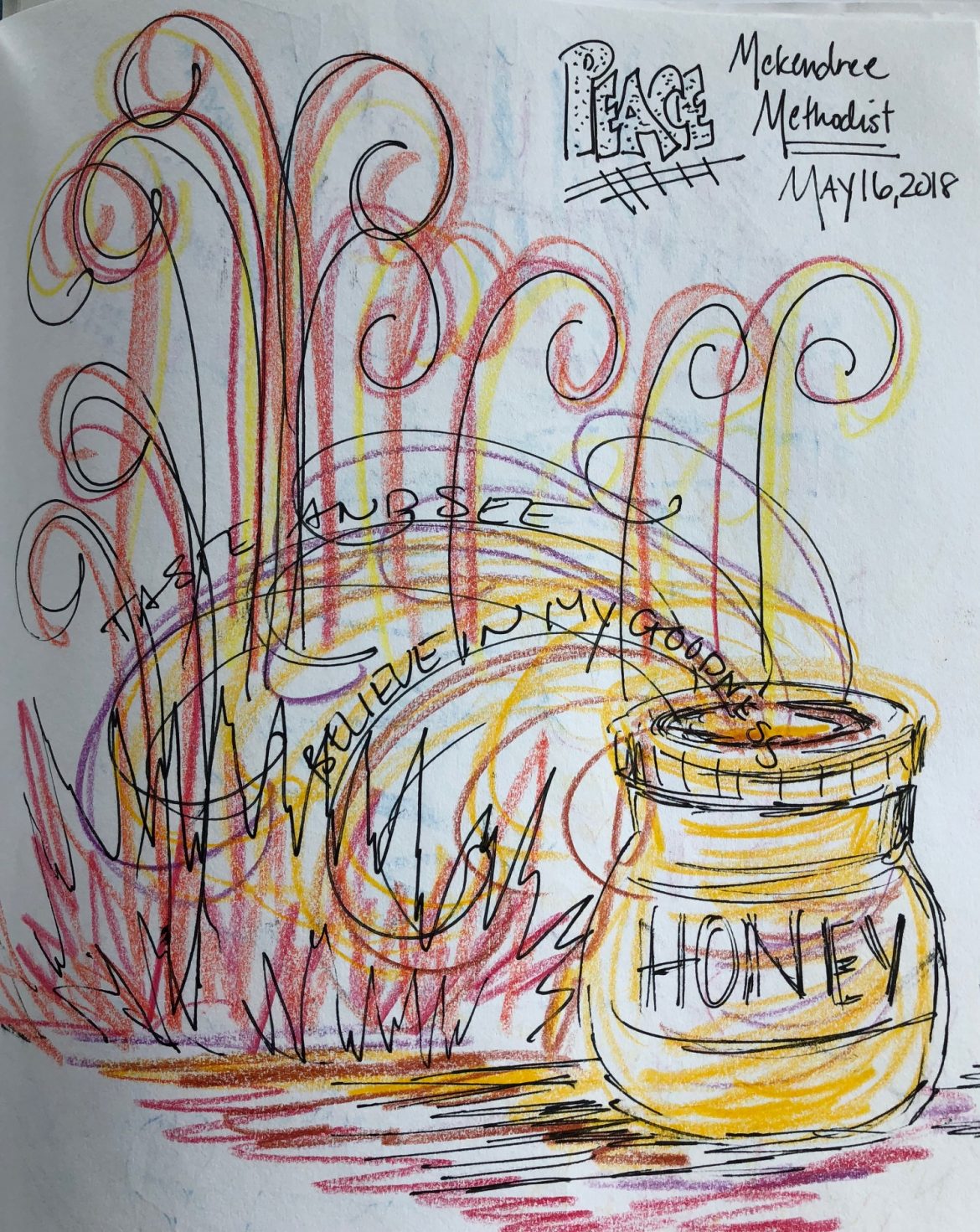Prayer is waking up to the presence of God no matter where I am or what I am doing. Barbara Brown Taylor An Altar in the World.
There is a difference between prayer and prayers. We are called to co-create with the living God yet often feel that expressing our creativity is discouraged. What stirs our creativity to pray without ceasing? Here is a list of the best books we have found.
Bill, Brent and Booram, Beth: Awaken Your Senses: Exercises for Exploring the Wonder of God
Benner, Juliet: Contemplative Vision: A Guide to Christian Art and Prayer
Brazzeal, David: Pray Like a Gourmet: Creative Ways to Feed Your Soul
Brookes, Mona: Drawing with Children
Brussat, Frederic and Mary Ann: Spiritual Literacy: Reading the Sacred in Everyday Life
Cameron, Julia: The Complete Artist’s Way Creativity as a Spiritual Practice
de Mello, Anthony: Wellsprings: A Book of Spiritual Practices
Edwards, Betty: Drawing On the Right Side of the Brain
Fox, Matthew: Creativity: Where the Divine and the Human Meet
L’Engle, Madeleine: Walking on Water: Reflections on Faith and Art
MacBeth, Sybil: Praying in Color: Drawing a New Path to God
Sark: Make Your Creative Dreams Come Real; Journal and Play!
Sine, Christine: Return to Our Senses: Reimagining How We Pray
Smith, Mandy: Making a Mess and Meeting God: Unruly Ideas and Everyday Experiments for Worship
Stanley, Kelly O’Dell: Praying Upside Down: A Creative Prayer Experience to Transform Your time With God
Scandrette, Mark: Practicing the Way of Jesus: Life Together in the Kingdom of Love
Taylor, Barbara Brown: An Altar in the World: A Geography of Faith
Tutu, Desmond and Mpho: The Book of Forgiving: The Fourfold Path for Healing Ourselves and Our World
Valters Paintner, Christine: Eyes of the Heart: Photography as a Christian Contemplative Practice; Lectio Divina: the sacred art: transforming Words and Images into heart-Centered Prayer; The Artist’s Rule; Illuminating the Way;
Wolpert, Daniel: Creating a Life with God: The Call of Ancient Prayer Practices
By John Birch —
By Jean Andrianoff —
I believe God loves color. Just look around at this time of year—fresh green grass; clouds of pink and white blooms on fruit trees; the vivid blue of sky and water (on a sunny day!); the lime green lace of new leaves; purple and yellow violets; rhododendrons of almost every conceivable hue. His creation is never boring. How much pleasure it must bring the Creator to observe the colorful world He has made or to see us enjoying it.
I’ve always loved to color, so I was delighted when adult coloring books became a “thing.” Now I can indulge my love of this childhood pastime with the approval and even encouragement of everyone from grandchildren to mental health professionals.
A year ago, I bought a set of reasonably-priced colored pencils, 24 colors per box, to indulge my hobby. When my husband was planning a trip to the city where I bought them, I asked him to buy another set. I was delighted when he said sets of 48 were also available. Would I like that instead?
I had felt reasonably happy with my 24 colors, but once I had 48 to choose from, I could do so much more. My pictures seemed to exhibit more life, more depth. As I reflected on this, I began to think about diversity. When we lived in Mongolia, we worked in an international consortium with people from nearly every continent. Our staff meetings reflected perspectives from Brazil, Denmark, Fiji, Australia, Korea, and many other countries. My best friend was British. We worshipped with Mongolians. When we left, life felt somehow flatter without this cultural and racial diversity.
Many of us live in a racially and ethnically homogeneous setting, rarely dealing with anyone who looks different or views the world differently from us. We may have to create opportunities to experience diversity. When we do, we begin to get a taste of what it will be like when we sit around the throne of the Lamb with “a great multitude . . . from every nation, from all tribes and people and languages,” praising our God.
The colors of racial difference are subtler than those of a sunny spring day, but I’m sure seeing the different hues of skin colors enjoying and appreciating one another must bring God even more pleasure than does a lovely landscape.
Lord, we thank you, for the many languages, colors, and cultures represented by mankind created in Your image. Give us opportunities to experience this diversity with openness.
After this I looked, and behold, a great multitude that no one could number, from every nation, from all tribes and peoples and languages, standing before the throne and before the Lamb, clothed in white robes, with palm branches in their hands, and crying out with a loud voice, “Salvation belongs to our God who sits on the throne, and to the Lamb!” Revelation 7:9,10 (ESV)
As we move beyond Pentecost there will be even more to keep your eyes open for on Godspace. Our theme will be Inspiring Creativity in Faith and Action. We are called to co-create with the living God yet often feel that expressing our creativity is discouraged. So lets explore our creative impulses and encourage each other on the journey. Perhaps you would like to shared your own creative inspiration for writing, journaling, crafting liturgies, and poems, painting, composing music or gardening. We are always looking for new contributors. Or you might want to just read along and invite your friends to join you!
To kick us off here is a lovely poem by John Birch who is a faithful contributor to Godspace with his poetry and prayers! —

by Christine Sine
I was one of 2 billion people around the world who watched the wedding celebrations of Prince Harry and Meghan Markle on Saturday. Like many I tuned in to enjoy the spectacle of medieval pageantry, archaic customs and pretty hats and heard instead a message of God’s inclusive love. If you haven’t listened to Michael Curry’s sermon yet it is well worth listening to and meditating on.
On Sunday, I celebrated Pentecost, that awe inspiring day of joy and passion that proclaims the coming of the Holy Spirit. Here too we heard the message of inclusive love. Under God’s banner there is neither Jew nor Greek, male nor female, slave or free. All are one in Christ. In God’s kingdom there are no illegal aliens, no undocumented workers, no abandoned or despised ones. In all our diversity of culture, language and creed we are welcomed into the family of God.
Both these events were incredible celebrations of hope and promise. The power of love can transform the world and make all things new.
Pentecost reminds us that God brings us together in diversity and uniqueness to break down barriers of prejudice, race and class and become one new family. The royal wedding gave us a glimpse of this as it brought together a remarkable couple across what once would have been insurmountable barriers of race, culture and prejudice.
Is This A Move of God?
In the last few months I have lived under a cloud of discouragement and doubt wondering what has happened to the power of God. We seem to live in a world of increasing racism, violence and environmental degradation. We continue to build walls not bridges. The loving unity God calls us to seems further away than ever.
Yet this weekend I caught a glimpse of something new that God is doing. That an African American woman could marry into the British royal family sends a powerful message. That one of the charities people were invited to support focuses on menstrual hygiene in India is remarkable. That the couple are concerned enough about sustainability to design beautiful floral displays that use local and seasonal flowers and greenery is remarkable. That Prince Harry has finally come out to talk about his own mental health crisis and his concern for the disabled is heartwarming. Change is possible, barriers of race, gender prejudice, mental health and pollution can be overcome.
I do believe God is doing something new. We have already seen it in Black Lives Matter and the Me Too movements. We have seen it in the young people standing up for gun reform and an end to school violence.
God Does Not Build Walls
This weekend reminded me that borders and walls designed to keep people out are created by humankind not by God. It is easy for all of us to lose sight of God’s passion for a world reunited in love and mutual care. It is easy to lose sight of God’s delight in diversity. It is much easier to judge than to include.
Not surprising really. Pentecostal fire comes with a price. To be transformed by the Holy Spirit we must die to anything that prevents us becoming united to each other in love. And that of course means dying to prejudices – prejudices against the royalty who have enslaved and impoverished many in the past, prejudices against those of different races, sexual persuasion or religious creeds, prejudices against those who suffer from mental illness – all these must die if we are to find the unity God asks of us.
I feel that this new royal couple has brought us one step closer to the unity God desires of us. Yes I know they are far from perfect and if we want to we can criticize much of who they are and what they stand for or we can stand with them for a world changed and made new.
The question in my own heart is What can I do to join this movement towards love? What can I do to bring us one step closer to the unity God desires of us? I hope that the same questions are stirring in your heart.
by Lynne Baab,
On Pentecost, we remember the coming of the Holy Spirit to the people gathered in Jerusalem for the Pentecost festival. You can read about it in Acts 2. Almost two millennia after Pentecost, we benefit every day from the presence of the Holy Spirit with us.
One of my seminary professor called the Holy Spirit the “shy” member of the Trinity. This professor was referring to the fact that the Holy Spirit’s role is to bring glory to the Father and the Son. Thus the Holy Spirit is the least visible person of the Trinity.
I invite you to ponder with me the role of the Holy Spirit in various Christian spiritual practices, to shine some light on this “shy” person in the Trinity.
Bible reading and meditation. The Holy Spirit opens our eyes and ears so we can see God more clearly through the words on the pages of the Bible. The Spirit also helps us apply the passage to our lives, helping us see the relevance of the words to our exact setting and context.
Intercessory prayer. The Holy Spirit guides us to pray for the things God values, giving us eyes to see God’s priorities and purposes. The Spirit helps us to see the places God is working so we can join our prayers with God’s current activity and priorities. In addition, the Spirit brings people to mind who need our prayers and helps us remember specific situations where God’s presence is needed.
Prayers of confession. The Holy Spirit brings to mind our sins and shortcomings, and reminds us of God’s forgiveness when we confess our sins.
Praise of praise and thankfulness. The Holy Spirit helps us see God’s gifts in our daily life and reminds us of the big picture of God’s creation and redemption of the world.
Prayers of lament. The Holy Spirit grieves over the brokenness of the world and invites us into that grief and sorrow.
Various forms of silent prayer. The Holy Spirit speaks to us in silence, bringing to mind truths about God and speaking that truth into our situations.
Worship. All that I’ve mentioned above illustrates how the Holy Spirit enables us to engage in worship, both alone and with others.
Fasting. The Holy Spirit gives us guidance of when to fast, what to fast from, strength and endurance during the fast, and guidance in what to pray for during the fast.
Sabbath keeping. The Holy Spirit calls us into rest, reassuring us that God is keeping the world going even when we are not participating. The Spirit gives peace and the ability to trust into God’s hands the things we could be doing but aren’t.
Communal spiritual practices. The Holy Spirit draws people together and provides love for one another. The Spirit guides and empowers groups of people as well as individuals.
Gordon Fee wrote a wonderful book about the Holy Spirit called God’s Empowering Presence. For Pentecost this year, I invite you to ponder that title. The Holy Spirit is God’s presence with us. What does God do in us? Empower us to hear God’s voice, receive God’s direction, persevere in following that direction, and rest in God’s goodness and grace. The Holy Spirit is God present with us in dozens of ways that empower us.
I’ve listed some of the ways God, through the Holy Spirit, is present with us and empowers us as we engage in spiritual practices. I’m sure you can think of more ways.
Jesus says to his disciples in the Upper Room, the night he was betrayed: “When the Spirit of truth comes, he will guide you into all the truth; for he will not speak on his own, but will speak whatever he hears, and he will declare to you the things that are to come. He will glorify me, because he will take what is mine and declare it to you” (John 16:13, 14, NRSV).
A prayer related to the Holy Spirit from the Book of Common Prayer: “O God, you have taught us to keep all your commandments by loving you and our neighbor: Grant us the grace of your Holy Spirit, that we may be devoted to you with our whole heart, and united to one another with pure affection; through Jesus Christ our Lord, who lives and reigns with you and the Holy Spirit, one God, for ever and ever. Amen.”
by Lilly Lewin
Waiting on the Holy Spirit.
I often say that I would have missed Pentecost.
I would have missed the promised Gift of the Spirit, God’s power and light that Jesus told his followers he would give them.
Why?
BECAUSE I DON’T LIKE TO WAIT!
I am really bad at waiting!
Jesus gives his followers a mission to Go into ALL the World and make disciples!
Tell AND show people all over the place about the LOVE of God in JESUS.
That’s amazing! That’s a mission I want to participate in! That gets me motivated.
But Jesus says WAIT…STAY in Jerusalem and wait for the Gift I will give you!
I am Not so good at STAYING and WAITING.
How about you?
Too often, I have found myself impatient with God’s timing and I get antsy.
I pray for wisdom and direction, but too often, I run ahead and try to do things on my own.
I’m not sure the disciples liked waiting either. But, they had the honor of hanging out with Jesus over time. They’d now witnessed his death, resurrection, and his ascension so they were probably ok with being surprised by whatever Jesus asked them to do, or not do.
So they stayed in Jerusalem, praying and doing life together in the upper room where so many marvelous things had happened.
Am I willing to stay still and wait?
Am I willing to wait on God’s timing for things rather than my own?
Can I be willing to be willing?
Today is the day before we celebrate Pentecost.
The day before the Gift of the Holy Spirit was poured out.
Maybe you too are in that “DAY BEFORE” season.
That season of wondering and waiting on what God is going to do.
That day, that season of uncertainty….about what’s next, about when God will act, about what God is up to in your life. Know that God is with you in this. Know that Jesus hasn’t forgotten you!
On this day before Pentecost, I am announcing to myself and to Jesus that I am willing to be willing. I am willing to wait on the Gift. I am willing to understand that today is all I have. Today is a gift from Jesus to me. What can I do to love more today? What can I do to receive God’s love in my life today? And what can I do to bring love and joy to my world today, right now? Not running ahead, not wishing I was somewhere else, but willing to just be present in today.
Even in the waiting! Even in the Day Before!

ACTION: What can help you receive the gift of the Spirit during Pentecost this year?
I often use ceiling fans or window fans as reminders of the Holy Spirit. When I see a fan, I ask for God’s Spirit to blow over me and fill me again.
I do this with the wind too! I love to go outside and just let the wind blow over me. To know that I’m not in control of this, God is!
Do you have a symbol that represents the Holy Spirit to you? What is it? Or what might you choose it to be for Pentecost this year? One year I chose this red bowl from the Cincinnati Art Museum (way before I had the image of enough from my Freerange Friday post) This year it’s a Jar of Honey. Jesus is reminding me that he is Good and I need to live in his love and sweetness.
I’d love to hear what symbols help you connect with the Holy Spirit.
Happy Pentecost to you!
As an Amazon Associate, I receive a small amount for purchases made through appropriate links.
Thank you for supporting Godspace in this way.
When referencing or quoting Godspace Light, please be sure to include the Author (Christine Sine unless otherwise noted), the Title of the article or resource, the Source link where appropriate, and ©Godspacelight.com. Thank you!







